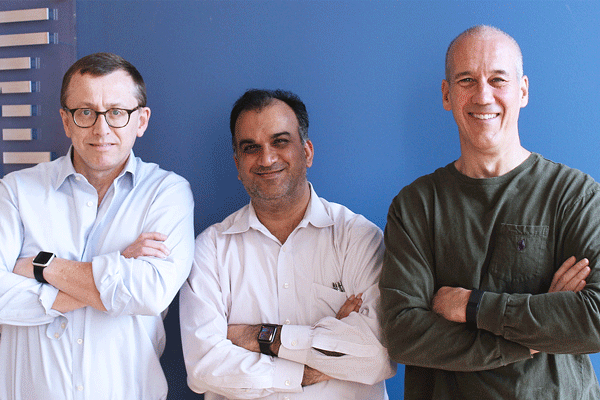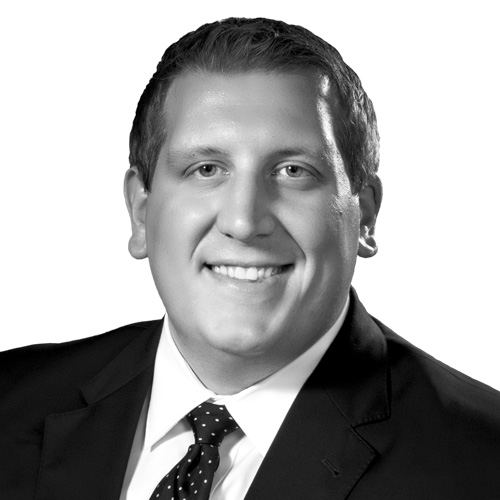“It’s been quite a ride with lots of evolution! To some degree, we still live under the same principles that we started with in 2009: we still feel like a small startup with the same passion and excitement.
Stephen McHale, Anil Jain, and I started this company out of a desire to truly transform healthcare by leveraging untapped data. We had to find a way to manage unprecedented amounts of data with computing power that wasn’t available yet in the mainstream—at least not a price point that the business could afford. We had to think beyond the concept of data warehouses.

In search for that something different, we spent some time in Silicon Valley, California, to talk to people who had dealt with actual big data. If you look at Google, it didn’t try to build a giant warehouse in the sky. What it came up with was a different type of technology—an incarnation of which began to emerge in the open-source community under the name of Hadoop. Recognizing how powerful this could be, we adopted it, and in doing so, it set us apart in terms of computing scale and affordability.
When you start a company, you wear a lot of hats. This was the third time I had birthed a startup. I look back at the big days and the little days during that six-year journey—from the mundane, like choosing our first fax machine/printer, to days when we closed millions in capital funding. I remember picking the first location. It was this converted storefront near Case Western Reserve University’s campus, next to a UPS store. You see all of it as an entrepreneur.
My role early on as chief technology officer was to take these ideas, along with the technology that Anil and his team had pioneered at Cleveland Clinic, to our engineering team to build upon. Doug Meil, another cofounder and our chief software architect, was instrumental in our leap in Hadoop—and has since then become a renowned expert in the field. Along with Steve, I also played the role of market evangelist and salesman as one healthcare system after another joined our network and we raised additional capital from investors. As a startup matures, you bring on others to specialize in these roles, but in the early stage, you’re involved in almost everything.
Now that we are part of Watson Health, my role is focused on market growth while paying close attention to the challenges faced within the healthcare ecosystem as transformation accelerates.
Big data is often characterized with three ‘V’s: volume, velocity, and variety.
Healthcare data volume is growing quickly, especially as exogenous and genetic data is increasingly captured. As consumers increasingly adopt Fitbits and glucose monitoring devices, data velocity will continue to grow.
Data variety is also a huge challenge in healthcare, even more so than in other industries. Take Starbucks, for example; a coffee drink will likely be coded the same whether purchased at a Barcelona Starbucks or a New Delhi one. That’s not the case in healthcare. It’s completely different. There’s a lot more variability, and that creates a challenge for providers when presented with conflicting information. We’ve seen organizations with dozens of different representations of the same lab test—a challenge that can only be met with powerful data normalization technology.
I would also add a fourth ‘V’ to the definition of healthcare big data: veracity. Healthcare data is notorious for having false positives, redundancy, and conflicting information, depending on the context in which it was collected. That said, if people can’t trust the data, they can’t embrace change. Data isn’t always logical, at least to the untrained eye. Hiring the right combination of healthcare-data experts and technicians has not been easy, but it’s been key to innovation. I think it’s also important to realize that we’ve all got some experience with someone we know that is battling something. To be part of that solution, or at least to help contribute to that solution, is one way to overcome that challenge of the competitive job market.
“Explorys wasn’t about building and selling a company. This was about taking big data and healthcare to the next level. We never settled, and there are many exciting days to come. We’re not about taking half-measures.” —Charlie Lougheed
In many ways, we are just as passionate as we were on day one. Many of us take the mission to improve healthcare personally. As for me, I put my life savings toward helping to start this company because I believed we could do this. At times, I’m a fiery leader, and while conventional wisdom cautions against mixing too much emotion with business, I tend to blur the lines when I think it will help motivate others. For instance, my mom is a diabetic, and I’m proud that our solutions enable her physicians to manage her care more effectively.
STAT SHEET
25%
employee growth between April and December 2015, from 150 to 200
315
billion longitudinal data points
26
healthcare networks
1k
pre-built analytics
15%
of the US population served
317k
providers
360
hospitals served
While we often speak about population health, it inevitably gets down to just one person, like my mom, and what can be done to help her reduce her risk of the disease and other associated diseases from progressing. In competition, I love to win; I really hate to lose—not because I think healthcare’s a game, but because I truly believe that providers deserve the advantages of Explorys and Watson Health.
In the early years, we were often asked how we are different from an enterprise data warehouse (EDW). There is actually a big difference, and this lies in the scope of what we consider big data. We consider everything within an organization’s four walls as being part of the enterprise. This is a large area, and a lot of great companies, including IBM, address this space well.
In contrast though, our focus is on the area we call the ‘interprise.’ The interprise includes components of the enterprise, but more importantly, extends to the systems and sources of data that are generated outside an organization’s four walls. In healthcare, that includes hospital networks, independent providers, external labs, insurance companies, employers, long-term care facilities, life-sciences companies, and even the home.
To be successful in this space of value-based care, you need to collaborate with those outside of your healthcare system. Naturally, these other organizations don’t necessarily want to push all their data to everyone in the mix. Small, independent practices don’t want to send all their data to large providers in their markets for fear of losing control of their patients should that independent practice decide to pull out of partnerships down the road. Data governance is a huge deal for everyone. Instead, these participants would rather use the cloud because it’s considered ‘neutral territory.’ It’s common ground, and in many ways, twenty-first-century healthcare is the new poster child for cloud-based relationships.
By the summer of 2014, we began to recognize that to scale the business to the level necessary to fundamentally improve healthcare, we needed to consider a growth strategy beyond one that was organic. We found that it was difficult to hire and train enough great people to keep up with the market demand. When a business grows as fast as we did, it can run the risk of overheating. We have really passionate people, but all that passion and hard work can also propagate burnout. We also recognized that if we wanted to grow, we had to think bigger. That’s when we decided that we would prepare the company to either go public or merge with another larger player.
After getting to know the key players in the industry, we came to the conclusion that IBM Watson Health was an organization that not only shared our values and aspirations to revolutionize healthcare, but also had the strategy and wherewithal to do it. So, in April 2015, we sold the company to IBM, becoming an integral part of the Watson Health backbone. This partnership is enabling us to scale quicker and better support our customers’ needs as we continue to build out our world-class analytics to provide insight into how to reduce costs while improving care outcomes.
I think it’s important for people to see the original founders continue to be highly engaged and excited about what they do. Explorys wasn’t about building and selling a company. This was about taking big data and healthcare to the next level. We never settled, and there are many exciting days to come. We’re not about taking half-measures. That’s an attitude that we all share, and it’s how we exemplify innovation and stay on the cutting edge.”

